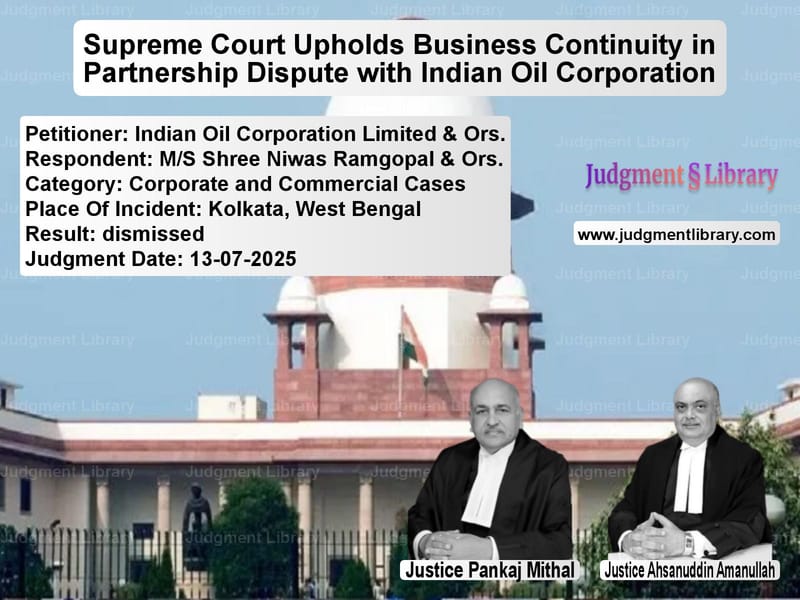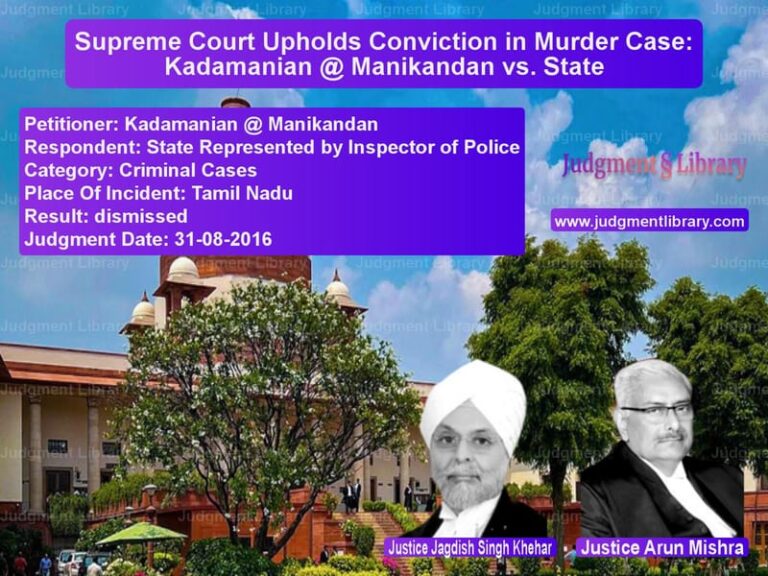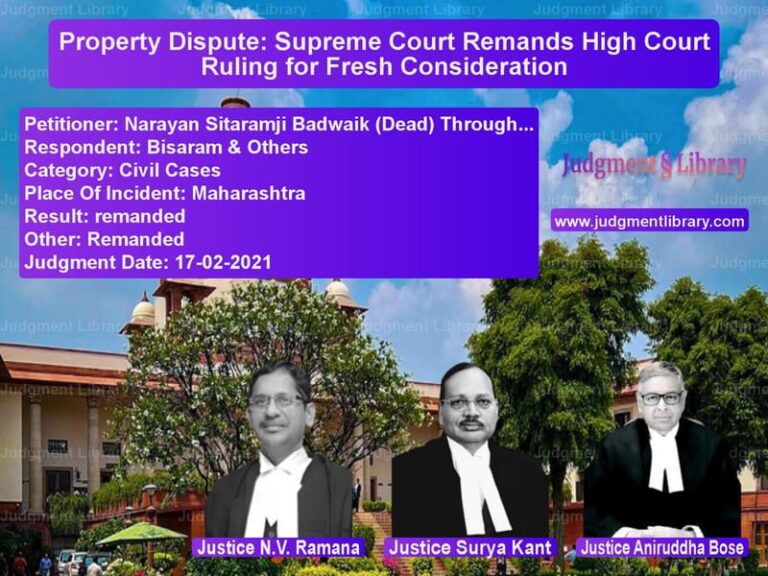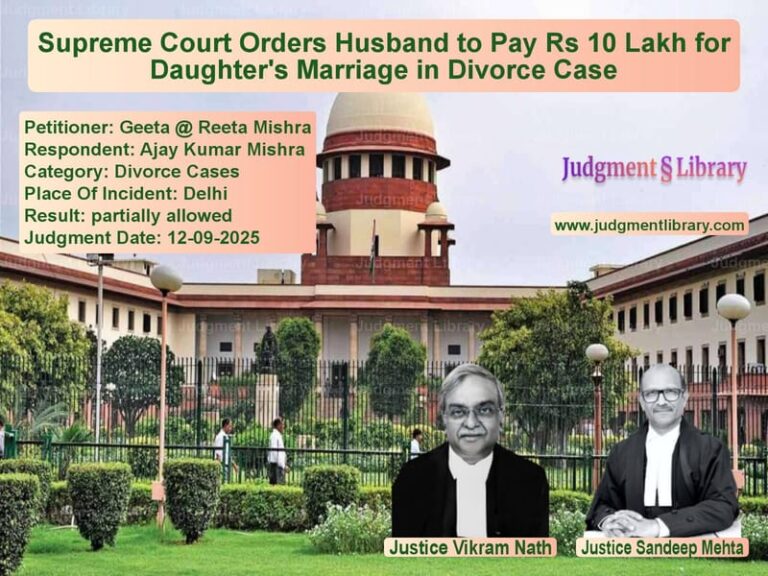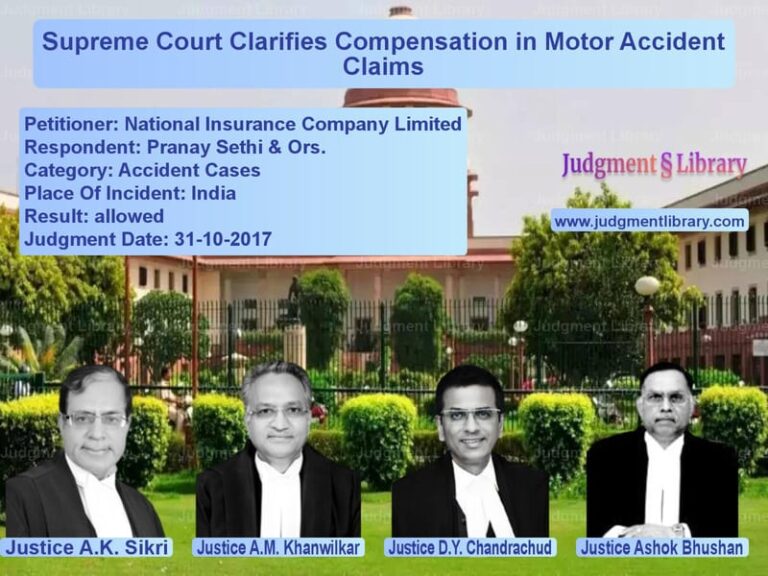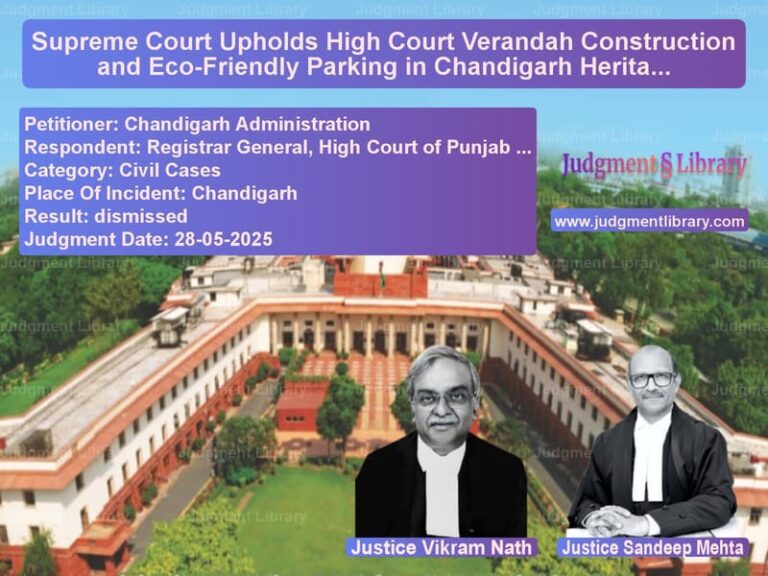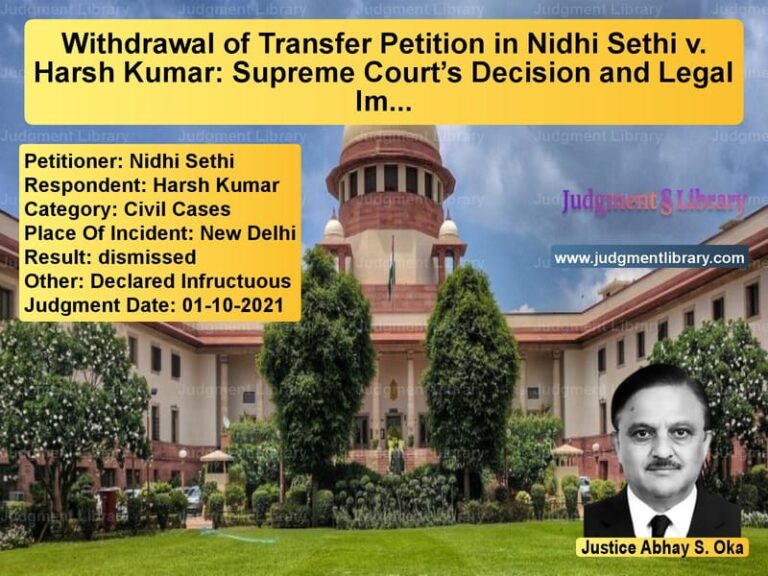Supreme Court Upholds Business Continuity in Partnership Dispute with Indian Oil Corporation
In a significant judgment that reinforces the principles of business continuity and fair dealing, the Supreme Court has dismissed Indian Oil Corporation’s appeal and upheld the rights of a partnership firm to continue its kerosene dealership despite the death of one of its partners. The case of Indian Oil Corporation Limited versus M/s Shree Niwas Ramgopal & Others highlights the delicate balance between corporate policies and contractual obligations, particularly when dealing with family-run businesses facing succession issues.
The dispute originated from a partnership firm that had been operating as a kerosene oil distributor for Indian Oil Corporation since 1990. The firm, originally a proprietorship of Kanhaiyalal Sonthalia, was reconstituted as a partnership in 1989 with Kanhaiyalal holding 55% share, his son Ramesh Sonthalia holding 35%, and another son Gobinda Sonthalia holding 10%. The partnership had been successfully running the dealership for nearly two decades when Kanhaiyalal Sonthalia passed away on November 29, 2009, leaving behind his wife, seven sons, and four daughters as legal heirs.
As typically happens in business families, disputes emerged among the heirs regarding the 55% shareholding of the deceased in the partnership firm. Different heirs made conflicting claims – one staking claim to partnership rights, another seeking details of assets and liabilities, and yet another claiming inheritance through a will dated May 28, 2008, for which he had applied for probate. This family dispute created complications for the continuity of the business relationship with Indian Oil Corporation.
The Legal Battle Begins
While the family disputes were ongoing, the surviving partners submitted a proposal on April 13, 2010, for reconstituting the firm with the two surviving partners and one of the legal heirs, Bijoy Sonthalia. However, Indian Oil Corporation refused to recognize this reconstitution and threatened to stop kerosene supplies beyond June 14, 2010, if a fresh agreement wasn’t executed. This compelled the firm and its partners to approach the Calcutta High Court under Article 226 of the Constitution.
The Single Judge of the High Court, in his judgment dated July 3, 2012, directed IOCL to allow the partnership firm to be reconstituted subject to any orders that might be passed in the probate case or by competent civil courts. The court specifically directed that till the rights of the legal heirs were decided, the partnership firm should be allowed to continue with its subsisting partners and receive kerosene supplies. Aggrieved by this decision, only Indian Oil Corporation appealed to the Division Bench, while none of the legal heirs challenged the order, indicating their acceptance of the arrangement.
The Division Bench, in its judgment dated July 4, 2018, upheld the Single Judge’s decision, holding that in view of the law laid down earlier by the High Court, IOCL was not entitled to discontinue kerosene supply. The Division Bench directed IOCL to continue supplies for one year and review the situation annually until the partnership firm was properly reconstituted.
The Supreme Court’s Analysis
The Supreme Court bench comprising Justice Pankaj Mithal and Justice Ahsanuddin Amanullah began by characterizing the case as one where “instead of acting in a just, fair and equitable manner, the statutory corporation, a state instrumentality, has acted in a high-handed manner while exercising arbitrary powers with no sense of fairness in a matter of commercial interest.”
The Court meticulously examined the contractual agreements and legal provisions governing the relationship. The dealership agreement dated May 11, 1990, specifically provided in Clause 30 that in the event of death of any partner, the subsisting partners must immediately inform IOCL with details of legal heirs, whereupon IOCL would have three options: “(i) either continue the dealership with the existing firm; or (ii) to have the fresh agreement of the dealership with the firm if reconstituted; or (iii) to terminate the dealership agreement.”
The Court noted that “It is an admitted position that the IOCL till date has not exercised the option of terminating the dealership of the firm, rather has provided opportunity to the firm to reconstitute itself.”
Partnership Deed vs Corporate Guidelines
The Court placed significant emphasis on Clause 18 of the partnership deed dated November 24, 1989, which specifically stipulated that “the death of any partner shall not cause discontinuance of the partnership business and that the surviving partners may continue the business and the interest of the deceased partner shall vest in the legal heirs of the deceased. The surviving partners have the option to admit any of the competent heirs of the deceased partner to the partnership on such terms and conditions as may be agreed upon.”
The Court interpreted this clause as permitting “the existing partners to continue with the partnership business notwithstanding the death of one of the partners, leaving it open for the surviving partners to induct any of the competent heirs of the deceased partner in the partnership business. It is not necessary for the surviving partners to include all the heirs of the deceased partners in the partnership or to wait for their consent to be included or not to be included in the partnership.”
The Court addressed the legal position under the Partnership Act, noting that “It is settled in law by virtue of Section 42 of the Partnership Act, 1932 that the partnership will stand dissolved inter alia on the death of the partner but this is applicable in cases where there are only two partners constituting the partnership firm. The aforesaid principle would not apply where there are more than two partners in a partnership firm and the deed of partnership provides otherwise that the firm will not stand automatically dissolved on the death of one of the partners.”
In this case, since there were three partners and the partnership deed specifically provided for continuity, the partnership would continue despite the death of one partner. The Court relied on its earlier decision in M/s Wazid Ali Abid Ali vs. Commissioner of Income Tax, Lucknow, which observed that “under the Partnership Act, on death or demise of a partner, the firm shall not be dissolved but shall be carried on with the remaining partners or by including the heirs and representative of the deceased partner on such terms and conditions mutually agreed upon.”
Interpretation of IOCL’s Guidelines
The Court critically examined IOCL’s revised policy guidelines dated December 1, 2008, particularly Clause 1.5, which provided that in case of death of a partner, the partnership shall be reconstituted with the legal heirs of the deceased partner and the surviving partners. IOCL had argued that since all heirs had not applied or joined the reconstituted partnership, they were not bound to continue business.
However, the Court found that “The aforesaid guidelines nowhere stipulates that it is mandatory for all the legal heirs to join or reconstitute the partnership firm or otherwise to express their unwillingness to participate. It simply provides that a firm can be reconstituted with the legal heirs of the deceased partner which does not in any manner mean that it is mandatory for all the legal heirs to join for reconstitution of the firm.”
The Court strongly criticized IOCL’s insistence that all legal heirs must join or provide No Objection Certificates, stating that “The insistence of the IOCL that all the legal heirs of the deceased partner should join the reconstituted firm or give ‘No Objection Certificate’ to the reconstituted firm would be contrary to the spirit of the original deed of partnership. The IOCL has no role to play in determining as to who is the competent heir of the deceased partner. It should be left on the wisdom of the existing partners.”
Supreme Court’s Final Ruling
The Supreme Court concluded that “In the wake of the above analysis and the discussion, the IOCL appeared to have misconstrued its own guidelines in not recognising the reconstitution of the partnership firm with the surviving partners and one new partner being one of the competent heir and legal representative of the deceased partner.”
The Court emphasized that “It is trite to mention that the IOCL is supposed to act in a manner which is beneficial for the continuance of the business and not to adopt an arbitrary approach thereby creating hinderance in the running business.”
Significantly, the Court noted that “none of the heirs and legal representatives were dissatisfied by the directions issued by the High Court as they have not assailed the same in any forum. Therefore, when the heirs and legal representatives of the deceased partner were not aggrieved, it was not appropriate for the IOCL to have taken a hyper-technical approach on the interpretation of the guidelines, so as not to extend the period of supply of kerosene or to stop the supply which, in effect, is axiomatic to the continuance and the smooth flow of business which was continuing for past many years.”
The Supreme Court ultimately dismissed IOCL’s Special Leave Petition, observing that “The Special Leave Petition is devoid of merit and is dismissed with the observation that the IOCL ought to avoid such litigations by interfering with the continuance of any running business by taking a narrow approach.”
This judgment serves as an important precedent for business continuity in partnership firms, particularly in cases involving succession issues. It reinforces that contractual terms in partnership deeds take precedence over corporate guidelines, especially when the guidelines are interpreted in a manner that disrupts ongoing business operations. The decision also underscores the responsibility of public sector undertakings to act fairly and equitably rather than taking hyper-technical positions that adversely affect business continuity and public interest.
Petitioner Name: Indian Oil Corporation Limited & Ors..Respondent Name: M/S Shree Niwas Ramgopal & Ors..Judgment By: Justice Pankaj Mithal, Justice Ahsanuddin Amanullah.Place Of Incident: Kolkata, West Bengal.Judgment Date: 13-07-2025.Result: dismissed.
Don’t miss out on the full details! Download the complete judgment in PDF format below and gain valuable insights instantly!
Download Judgment: indian-oil-corporati-vs-ms-shree-niwas-ramg-supreme-court-of-india-judgment-dated-13-07-2025.pdf
Directly Download Judgment: Directly download this Judgment
See all petitions in Contract Disputes
See all petitions in Company Law
See all petitions in Corporate Governance
See all petitions in Corporate Compliance
See all petitions in unfair trade practices
See all petitions in Judgment by Pankaj Mithal
See all petitions in Judgment by Ahsanuddin Amanullah
See all petitions in dismissed
See all petitions in supreme court of India judgments July 2025
See all petitions in 2025 judgments
See all posts in Corporate and Commercial Cases Category
See all allowed petitions in Corporate and Commercial Cases Category
See all Dismissed petitions in Corporate and Commercial Cases Category
See all partially allowed petitions in Corporate and Commercial Cases Category

